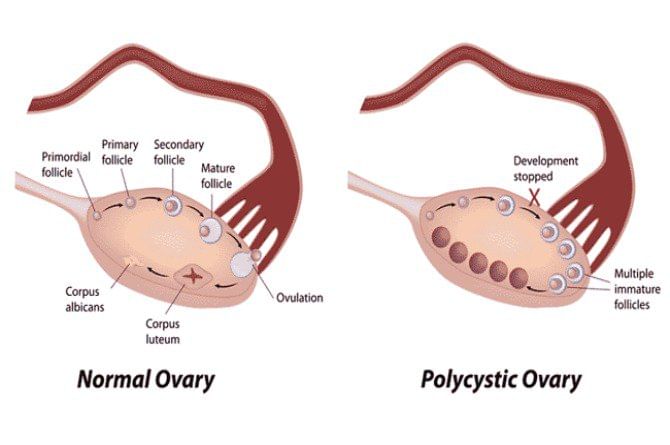Everything You Need To Know About PCOD
Everything you need to know about Polycystic Ovarian Disorder (PCOD)PCOD affects almost 17 percent of Indian women.
PCOD in India
This hormonal imbalance affects many women in India. A pan India survey was recently conducted by the Metropolis Healthcare Ltd, on 27,411 samples of testosterone over a period of 18 months. Out of these 27,411 samples, around 4,824, (17.60 percent) of the females faced hormonal risks including polycystic ovarian syndrome.
What is Polycystic Ovary Disease (PCOD)?
Polycystic Ovary Disease (PCOD), is a condition where a woman develops enlarged ovaries and small follicular cysts that are of the diameter 0.5-1.0 cm. This leads to a collection of eggs in the ovary that cannot be discharged from the body. “A woman with PCOD will also have symptoms that reflect imbalances in reproductive and other hormones. Here, the ovaries make more androgens (male hormones) than normal. High levels of these hormones affect the development and release of eggs during ovulation."
The following symptoms of PCOD, which large affects women of all age groups and may vary:
- In adolescent women, PCOD symptoms include infrequent, absent, and/or irregular menstrual periods and hairfall.
- In reproductive age group, women face fertility issues, requiring assistance in form of fertility treatments. In fact, PCOS is the most common cause of female infertility.
- Hirsutism— increased hair growth on the face, chest, stomach, back, thumbs, or toes.
- Cysts in the ovaries can also cause acne, oily skin, or dandruff.
- It may also lead to weight gain or obesity, usually with extra weight around the waist and male-pattern baldness or thinning of hair.
- One may also notice patches of skin on the neck, arms, breasts, or thighs that are thick and dark brown or black skin tags — excess flaps of skin in the armpits or neck area.
"Changes in lifestyle, lack of exercise, dietary habits, exposure to environmental pollution, stress levels and loss of work life balance have become the primary causes of PCOD which can also lead to hypertension, diabetes mellitus, increased risk of uterine cancer and even cardiovascular diseases," she says.
Remedies for PCOD
Experts suggest that if symptoms are identified at an early age and brought under control, it can help reduce the chances of having complications like diabetes and heart disease. "However, the primary steps are eating right, exercising and not smoking.
#1 Lifestyle modification
"Many women with PCOD are overweight or obese, which can resultantly cause many health problems. The way to manage PCOD is by eating healthy and exercising to keep weight at a healthy level,". You can do the following:
- Limiting processed foods and foods with added sugars
- Add more whole-grain products, fruits, vegetables, and lean meats to your diet. "This helps to lower blood glucose (sugar) levels, improve the body's use of insulin, and normalise hormone levels in your body. Even a 10 percent loss in body weight can restore a normal period and make your cycle more regular," she says.
#2 Dietary changes
You must include whole grains in your daily diet to make up for the needed amount of protein
- Fiber contributes to improved blood sugar control and healthy bowel function. Aim to eat 25-30 grams of fiber per day.
- Protein helps balance your blood sugar and can help tame a sweet tooth. Include fresh fish, lean red meat, organic chicken, organic eggs, whole grains, and legumes in your diet, which are all good sources of protein.
- The type of fat in your diet plays an important role in assisting with insulin reception at the cell level. Use cold-water fish, organic eggs, avocados, extra virgin olive oil, and raw nuts and seeds that are rich in essential fatty acids.
- Ensure you eat regularly and choose healthy snacks mid-morning and mid-afternoon to balance your blood sugar levels between meals.
- Also make sure you add fruit, nuts, seeds and natural yogurt- all make for healthy snacks.
You can also ask your gyneacologist if you can include birth control pills and if so, which one's suit you best. For women who don't want to get pregnant, birth control pills are extremely helpful. They do the following:
- Control menstrual cycles
- Reduce male hormone levels
- Help to clear acne
#4 Diabetes medications
"The medicine Metformin (Glucophage) is used to treat type 2 diabetes. Metformin affects the way insulin controls blood glucose (sugar) and lowers testosterone production. It slows the growth of abnormal hair and, after a few months of use, may help ovulation to return,"
She adds that recent research has shown Metformin to have other positive effects, such as decreased body mass and improved cholesterol levels. "Metformin will not cause a person to become diabetic,"
#5 Surgery
Ovarian drilling is a surgery that may increase the chance of ovulation. It's sometimes used when a woman does not respond to fertility medicines.
#6 Medicine for increased hair growth or extra male hormones
"Medicines called anti-androgens may reduce hair growth and clear acne. Spironolactone (speer-on-oh-LAK-tone) (Aldactone), first used to treat high blood pressure, has been shown to reduce PCOD. These medications should not be taken if you are trying to become pregnant," says. She lists a few other options:
- Vaniqa cream to reduce facial hair
- Laser hair removal or electrolysis to remove hair
- Hormonal treatment to keep new hair from growing
She adds that some research has also shown that bariatric (weight loss) surgery may be effective in resolving PCOD in morbidly obese women (BMI of more than 40).
#7 Fertility medications
"Lack of ovulation is usually the reason for fertility problems in women with PCOD. Several medications that stimulate ovulation can help women with PCOD become pregnant. Even so, other reasons for infertility in both the woman and man should be ruled out before fertility medications are used. Also, some fertility medications increase the risk for multiple births (twins, triplets).
She lists the following treatment options:
- Clomiphene (Clomid, Serophene): The first choice therapy to stimulate ovulation for most patients.
- Metformin taken with clomiphene: This may be tried if clomiphene alone fails. The combination may help women with PCOS ovulate on lower doses of medication.
- Gonadotropins: It is given as shots, but are more expensive and raise the risk of multiple births compared to clomiphene.
Another option is in vitro fertilisation (IVF), which offers the best chance of becoming pregnant in any given cycle. It also gives doctors better control over the chance of multiple births.
Most women have symptoms that are normally associated with menopause. "These include hot flushes, vaginal dryness, irritability, night sweats, or difficulty sleeping. Menstrual periods may be sporadic or stop completely. Some women may never begin having menstrual periods and may not go through the normal sequence of puberty,".
She adds that while PCOD does pose a problem with respect to fertility, it must be noted that it is not incurable.



+1.svg)
